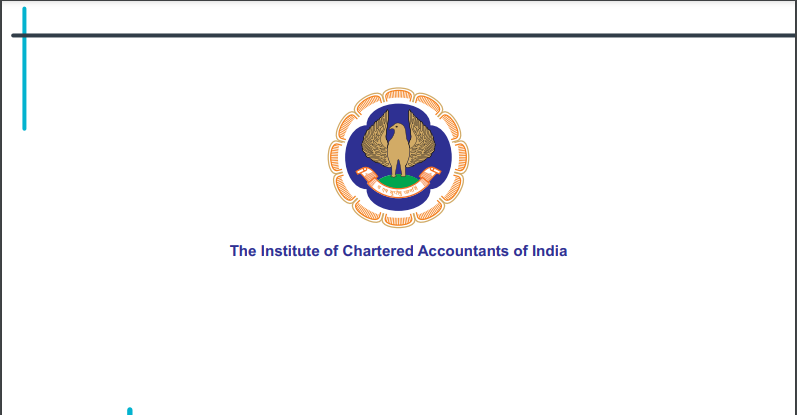Concept Paper On All about Fair Value: ICAI
1. Introduction
Financial reporting in India has undergone a significant transformation owing to the adoption of Indian Accounting Standards (Ind AS) and fair value is the guiding principle in financial reporting across the globe. The Institute of Chartered Accountants of India (ICAI) converged accounting standards with IFRSs and accordingly, the financial statements beginning from the accounting year 2016- 17 started disclosing financial figures based on fair value measurement. Fair value is a common basis of value associated with financial reporting valuations and is utilized throughout the Indian Accounting Standards.
It is the price that would be received to sell an asset or paid to transfer a liability in an orderly transaction between market participants at the valuation date.
In the year 2018, ICAI has also issued ICAI Valuation Standards, 2018 and the Standards have been formulated to meet the requirement of giving guidance/ valuation to determine the “Fair Value” as per Ind AS 113 as notified by the Ministry of Corporate Affairs.
The increasing importance placed by international accounting authorizes on Fair Value (FV) reinforces the need for the consistent use of valuation practices worldwide. Fair value accounting can make one’s businesses appear more volatile than they actually are. Fair value accounting is argued to facilitate investors’ risk assessment through transparent reporting of the underlying business. However, measurement issues and misunderstanding of fair value information may lead to excess stock price volatility.
Related Topic:
Illustrative Engagement Letter for a Compilation Engagement by ICAI
The Revised Model Business Corporation Act (RMBCA) of the United States defines fair value as:
“The value of the shares immediately before the effectuation of the corporate action to which the dissenter objects, excluding any appreciation or depreciation in anticipation of the corporate action unless exclusion would be inequitable.”
Fair Value is the standard of value currently used in at least two legal contexts. The first use of Fair Value is that it is the standard of value used in financial statement accounting for publicly traded companies.
Related Topic:
Guide to CA Certificates in GST: ICAI
2. Fair Value and Ind AS
With the introduction and the subsequent adoption of Ind AS by many Indian companies, the emphasis on valuation has increased.
The basis of value is closely related to the purpose of a given valuation exercise and can often vary. Selecting an appropriate basis of value is critical. For example, Fair Value is generally used for financial reporting purposes while Fair Market Value is used for tax reporting purposes. Other standards of value include investment value, liquidation value, etc. Investment value reflects the value to a specific buyer/seller while liquidation value reflects the possible price of a business or an asset when operations are being discontinued or the assets/liabilities are being sold piecemeal.
Related Topic:
Technical Guide on the Provisions of Independent Directors with Corporate Governance Perspective: ICAI
3. Definition of Fair Value as per Ind AS- 113
Typically, Fair Value is a commonly utilized basis of value. Ind AS 113 – Fair Value Measurement defines Fair Value as:
The price that would be received to sell an asset or paid to transfer a liability in an orderly transaction between market participants at the measurement date.
Related Topic:
In case of conflict, can the Provisions of Income Tax Act prevail over Accounting Standards ?
4. Key aspects of Fair Value as per Ind AS 113
Key aspects of Fair Value as per Ind AS 113 include:
• Fair Value is based on the exit price i.e. the price that would be received to sell an asset or paid to transfer a liability, not the transaction price or entry price or the price that was actually paid for the asset or that was received to assume the liability. Generally, entry and exit prices are different. The idea of exit price is based on expectations about the sale or transfer price from the perspective of market participants as of the valuation date.
• Fair Value emphasizes the concepts of a “principal market” and the “most advantageous market” with respect to the business/asset being valued. The principal market is defined as the market with the greatest volume and level of activity for the subject asset or liability. Ind AS 113, specifies that in the absence of a principal market, the most advantageous market should be considered. The most advantageous market is the market that maximizes the amount that would be received to sell a given asset or minimizes the amount that would be paid to transfer the liability, are taking into account transaction costs and transportation costs.
• Fair Value measurements should reflect market participant assumptions in pricing an asset or liability. Market participants are assumed to be buyers and sellers in the principal (or most advantageous) market that are knowledgeable independent, unrelated pares willing and able to transact for the asset or liability being Fair Valued without compulsion.
• The highest and best use (“HABU”) of a nonfinancial asset or group of nonfinancial assets and nonfinancial liabilities is the use by market participants that maximizes the value of the nonfinancial assets/liabilities. This Fair Value concept considers (i) the different ways of utilizing the individual asset/liability, i.e. the highest and best use, and (ii) the valuation premise, whether the maximum value is on a standalone basis or in combination with other assets.
• Fair Value measurements should consider characteristics of the assets/liabilities being valued such as the condition, location, restrictions associated with the sale or use of an asset as applicable. Liability fair valuation should reflect non-performance risk.
Read & Download the full Copy in pdf:
If you already have a premium membership, Sign In.
 ConsultEase Administrator
ConsultEase Administrator
Consultant
Faridabad, India
As a Consultease Administrator, I'm responsible for the smooth administration of our portal. Reach out to me in case you need help.













